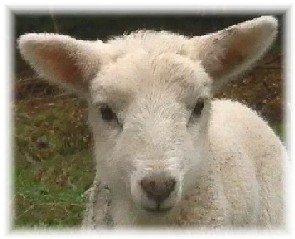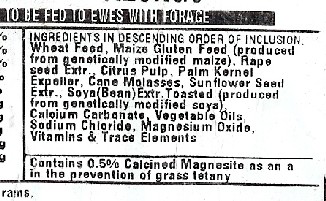|
Blog Feeds
Anti-Empire
Human Rights in IrelandPromoting Human Rights in Ireland
Lockdown Skeptics
Voltaire NetworkVoltaire, international edition
|
Animal Feeds In Ireland Are Contaminated With GMOs national |
environment |
feature national |
environment |
feature
 Tuesday December 07, 2004 23:39 Tuesday December 07, 2004 23:39 by Christine Raab-Heine - CLEAN(Cavan Leitrim Environmental Awareness Network)Ltd by Christine Raab-Heine - CLEAN(Cavan Leitrim Environmental Awareness Network)Ltd chheine at iolfree dot ie chheine at iolfree dot ie
 GM Regulations for Labelling of Animal Feed are a Farce
Related Links: Feed mills freely label their feeds as containing GM! They say that the countries of origin cannot give guarantees that their exports are not contaminated with GM, and so they don’t even bother to examine the GM content, or attempt to keep the content below 0.9%, which would mean that the feed would not have to be labelled as containing GM. We are further not told about the actual percentage of GM content. This is one of many flaws in the EU regulations on GMOs. Another flaw is the fact that meat from animals fed on GMOs does not have to be labelled as such. If consumers would have the opportunity to insist on GM free meat, it would not be so easy to infect our farm animals and products with GMOs, and the actual farce of labelling feeds we have at the moment would become an instrument helping to keep GMOs out of the country.
If basically all Irish meat, apart from qualified organic meat, is GM meat, i.e. meat from animals fed on GMOs, this might have, apart from the unforeseeable dangers to animal and human health, serious effects on the Irish farm, food, gastronomic and tourism sectors. Conversely keeping Irish feedstuffs and meat GM free could be a boost to these sectors. Immediate action is needed here as it is now that the bulk of feeding compounds starts. Let us have GM free lambs next year.
 Why do we not want this to happen? Why do we not want this to happen? Because as GM technology is an invasive technology, there is no co-existence between GMO and "normal" organisms possible. This has the unavoidable and ultimate consequence that if we allow GMO technology now, we will have no other organisms than genetically modified ones living on this planet in the future! We will never have a choice again! As this is the simple and dreary truth, this technology is undemocratic, because it determines the ultimate future of the whole planet and all living things on it, potentially including the human race, without any need or justification! In common with other new technologies, the development of genetic engineering is largely controlled by a few powerful corporations. These corporations exert unprecedented influence over governments and academia, who are both failing in their obligation to adequately monitor and control the development and use of this technology and to safeguard public health and the environment. It is clear that there is too much uncertainty about GMOs, and consequently we cannot accept them! And so:
 Further notes:
Further notes:Let us, as citizens, maintain this: In life absolute certainty does not exist. Therefore any risk analysis, also for GMOs, is based on reasoned assumptions. Our assumptions are based on the best available data and knowledge. In case we conclude that there is too much uncertainty about the product with respect to possible adverse effects for human health and the environment, a product will not be accepted. Only some weeks ago a vCJD case was diagnosed in Ireland, which only developed after an incubation period of many years, and which is thought to have been caused from eating meat from cattle fed on meat and bone meal. We all know that it was only disclosed after years that this caused BSE. Feeding meat and bone meal to herbivores was unnatural. Feeding GMOs to animals is also unnatural, as is the production of them in the first instance, which is unfortunately developed globally by big corporations. We take an enormous risk by eating meat or drinking milk from animals fed on GMOs! Only recently the IFA showed concern in respect of a case of contamination of feeds with bones in imported feed ingredients. The ongoing GM contamination, however, was not mentioned in this context! Without going into details regarding all issues of concern with respect to GMOs, we wish to stress, that one of the key findings of a new report by Freese and Schubert on “Safety Testing and Regulation of Genetically Modified Foods” (available on www.foe.org ) was “The failure of companies to test for most possible unintended effects of the unpredictable genetic engineering process; in particular, there is a lack of long-term animal feeding studies”. The kind of safety we are promised by scientific risk assessments in the EU becomes clear in a recent assessment report for GM cotton: “A comment was made by Miep Bos in respect of the notification report: The GMO should not be admitted because the notification states too often, that the product is “highly unlikely to have any adverse effect”. There are no hard facts but only assumptions that the product will not be harmful. That is not sufficient.” The answer from Netherlands CA was: “Within science absolute certainty does not exist. Therefore any scientific risk analysis, also for GMOs, is based on reasoned assumptions. These assumptions are based on the best available scientific data and knowledge. In case it is concluded that there is too much uncertainty about the product with respect to possible adverse effects for human health and the environment, a product will not be admitted.” Science was and is often helpful in explaining what has happened, albeit it has so far failed in explaining with certainty causes and origins of Aids, BSE and vCJD, for example. Science might be successful to develop new technologies, but science has not shown so far to be in a position to predict, determine or evaluate with certainty possible outcomes of such inventions. As econexus puts it: “The application of new technologies has historically been problematic. Though they are often proposed as a solution to a current problem they themselves may create new ones which were not predicted in time and others that were predicted only by specialists who were ignored. Additionally, the hope of a simple technical solution to a complex problem may distract attention and divert resources from essential political and social responses to the initial or underlying problem. (../www.econexus.info) One of the findings of Freese/Schubert and also of Wilson, Latham, Steinbrecher: Genome Scrambling – Myth or Reality? (available on the econexus website) was that their is a huge lack of independent “available” tests for long term effects of GMOs. At the same time when the IUCN World Conservation Congress 2004 has passed a moratorium on the further release of genetically modified organisms until such time that they can be demonstrated beyond reasonable doubt, to be safe for biodiversity, human health and animal health, the US plans to allow contamination of food crops with GM experimental crops. As two thirds of US experimental GM crops contain genes classified as confidential, there are no possibilities to detect them. (www.foe.co.uk) According to the ISAAA (International Service for the Acquisition of Agri-Biotech Applications), the US was growing 42.8 million hectares of the global transgenic crop area (63% of global total) in 2003. (Global Status of Commercialized Transgenic Crops:2003)
|























 Are you aware that all compound feeds commonly fed to farm animals contain GM maize and other GM meal?
Given the state of information and discussion in this country on GMOs,
many a farmer won't know this. But worse: it is virtually impossible
for conventional farmers, especially small farmers, to get GM free
compound feeds from their local suppliers. We are pretty sure that the
presence of GMOs in animal feedstuffs is well known to the Department
of Agriculture and other officials, but did they properly inform small
farmers and consumers? Farmers and consumers: please check the small print on feed bags and food labels.
Are you aware that all compound feeds commonly fed to farm animals contain GM maize and other GM meal?
Given the state of information and discussion in this country on GMOs,
many a farmer won't know this. But worse: it is virtually impossible
for conventional farmers, especially small farmers, to get GM free
compound feeds from their local suppliers. We are pretty sure that the
presence of GMOs in animal feedstuffs is well known to the Department
of Agriculture and other officials, but did they properly inform small
farmers and consumers? Farmers and consumers: please check the small print on feed bags and food labels. printable version
printable version

 Digg this
Digg this del.icio.us
del.icio.us Furl
Furl Reddit
Reddit Technorati
Technorati Facebook
Facebook Gab
Gab Twitter
Twitter
View Full Comment Text
save preference
Comments (14 of 14)